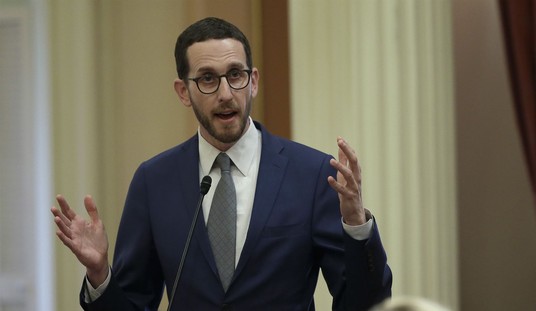Bad news for Mary Katharine, and good news for Fox viewers: we may get Weed Shoutfest III in the near future. The New Hamphire state legislature narrowly endorsed a bill yesterday that would legalize marijuana for recreational use, following the model pioneered by Colorado. The vote in this case was bipartisan — and contentious — but don’t start toking up yet in the Granite State:
After a passionate debate, the New Hampshire House of Representatives endorsed a bill Wednesday that would legalize marijuana in the state.
The vote was a nail-biter, with closely divided legislators initially voting against legalization 170-168 before choosing to vote again, the second time approving legalizing pot with 170 votes.
The bill, HB 492, would decriminalize possession of one ounce of marijuana by adults age 21 or older and allow residents to grow up to six plants. State-licensed stores would be authorized to sell marijuana.
After preliminarily endorsing the measure, lawmakers referred it to a second House committee, the Ways and Means Committee, for further refinement.
There are a couple of points here that will harsh the mellow of libertarians cheered by this development. First, as the story notes, this doesn’t mean that the bill has actually passed yet. It has to go back to committee and then return to the floor for a final vote. The slender two-vote margin for endorsement is a fragile majority, and the initial skepticism of the bill will no doubt increase when legislators see the final product. Those who switch from endorsement to opposition can always claim to support the idea in principle while claiming that the proposed execution of the idea was too flawed to support in the end, and I’d be surprised if that impulse is only limited to one or two legislators.
Second, the governor already has declared she’ll veto the bill if it passes:
Supporters hope that renewed attention on the issue from Washington and Colorado legalizing the drug might make a difference in New Hampshire. But Gov. Maggie Hassan said Monday she would veto any such bill.
Less than six months ago, Hassan signed a bill allowing the medical use of marijuana.
“But I don’t support the decriminalization of marijuana any further, and I would veto it if it comes to my desk,” she said.
Even if the 170-168 majority is sustained for approval, it’s far short of a veto override. Don’t think Hassan’s office isn’t working the phones to avoid having to impose the veto, either. It’s safer politically to keep it from coming to her desk.
Besides, from a strategic standpoint, what’s the rush? Colorado already got the headlines for going first. Other state legislatures inclined to follow suit have a better option in waiting. Why not let the experiment in the Rockies play out for a little while? If things go bad in Colorado, then all they have to do is take no action at all. Even if it turns out to be a net positive, other states will be able to better craft legalization legislation to avoid any problems that do arise.
As an apertif, here’s the video from Steven Crowder last year on the marijuana debate. Steven argues that there is a valid argument for getting the federal government out of marijuana prohibition, but rebuts the argument that pot is harmless or less harmful than alcohol – as well as provides an entertaining bit of vox populi from Ann Arbor, Michigan. Whether you agree or not, it’s good for another look and another laugh. At least no one’s yelling in this one:
Update: I missed this from yesterday, but Gabriel Malor didn’t:
An appeals court Wednesday affirmed the federal government’s long-standing policy that California medical marijuana dispensaries have no protection under state law from drug prosecutions.
The 9th U.S. Circuit Court of Appeals ruled Wednesday that three California dispensaries, their customers and their landlords are barred from using a state law allowing marijuana use with a doctor’s recommendation as a shield from criminal charges and government lawsuits. All uses of marijuana are illegal under the federal Controlled Substances Act, also known as the CSA, even in states that have legalized pot.
The ruling upholds three lower court decisions and follows previous rulings by federal appeals courts and the U.S. Supreme Court.
In other words, federal law on this point — the Controlled Substances Act — trumps state law, even for “medicinal” marijuana. That doesn’t mean the DoJ will start pressing federal charges in California or Colorado, which they seem disinclined to do at the moment. But they can.








Join the conversation as a VIP Member